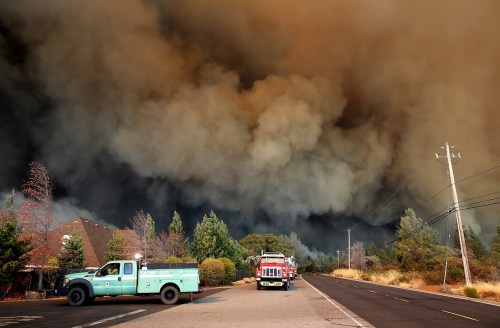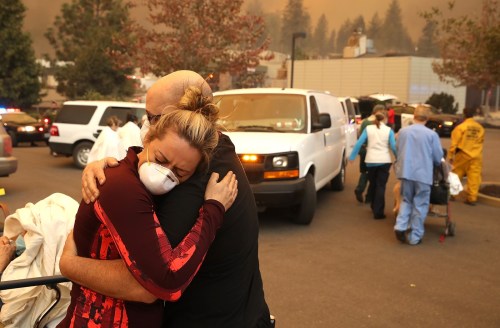California is burning: What do we do after the fires are out?
The California wildfires of 2018 are having effects on mental health. Read one person's experience of living near the Woolsey Fire.

California is on fire. Again.
Up north, the Camp Fire has become the deadliest in the state’s history. Near Los Angeles, the Woolsey and Hill Fires have forced thousands of people to leave their homes. The pictures are horrific, the stories heartbreaking. For survivors, the trauma is only beginning; for the rest of us, we’re struggling to wrap our heads around the enormity of it all. A friend in Malibu has evacuated to stay with her parents in Ojai, which itself was covered in ash during last year’s Thomas Fire. She doesn’t know whether her home is still standing. Up north in Berkeley, another friend says that her child doesn’t want to go to bed because he fears their house will burn while the family sleeps.
As my lungs began to burn after only a few minutes outside, I thought, “We cannot live like this.”
I’m fortunate to live 40 miles from the Woolsey Fire; our home is safe this time. And yet, I can’t stop thinking about a moment from this past weekend. On Saturday afternoon, I was running errands with my toddler son. (There’s something ironic about walking to the grocery store for healthy, cruciferous vegetables as the world literally burns around you.) It was almost 4 p.m., but the sky had already darkened into what looked like a sunset. A wall of smoke had mostly obscured the sun, slivers of which burned bright red, and the sky was painted in vivid pinks and grays. It was dim enough that cars drove with their headlights on; a bicyclist pedaled past while wearing an air-filtration mask. It was a beautiful, bizarre, and horrible scene. As my lungs began to burn after only a few minutes outside, I thought, “We cannot live like this.”
I mean that figuratively, but also literally. These fires are harbingers of a new climate, one that threatens all species on this planet. Hurricanes, droughts, fires, floods—all of these things are happening more often, and more intensely, due to the warming Earth. Climate scientists estimate we have between 10 and 12 years to limit the effects of climate change to being merely “bad” instead of catastrophic. I don’t know about you, but if this is “bad,” I don’t want to experience what’s worse.

When I look at my son, innocent and bright-eyed, I worry about his future. More precisely, I worry about whether he’ll even have a future. Will he be able to breathe? Will he have to learn survivalist farming? Will he grow up to live in The Road? I know that sounds melodramatic, trust me. My greatest hope is that someday, he and I will have a laugh about how worried I got about climate change.
I worry about whether my son will even have a future.
But I don’t think that we will unless all of us take action, and now. The bad news about climate change is that yes, it’s man-made, and the crisis is here. Not coming soon, not a few decades away. It is here. The problem can seem daunting, depressing, and inevitably doomed. Conversely, it might seem like something that can be solved if only we all stop using plastic straws—easy! (Yes, we should do that, but that’s not enough.) It’s normal to feel overwhelmed, hopeless, or anxious around climate change. I’ve been there. Hell, I’m often still there. The only thing that pulls me out of those moments of despair is action. Funneling those big feelings into an effort to rein in polluters and greedy fossil-fuel corporations—now, that’s a scrappy fight I’m up for.
The drumbeat of climate news is admittedly bad, but here’s what often gets lost in the gloom. It’s not too late to stop the worst-case scenario from happening. I repeat: Not too late! Individually, that can start with small steps like eating less meat or none at all; driving less and, if possible, driving an electric vehicle; divesting from fossil fuels; pushing politicians to support big, daring, wild ideas that support green energy and carbon taxes. Collectively, this will add up to effect change, but only if all of us start to care.
It’s not too late to stop the worst-case scenario from happening.
If you were moved by firefighters battling the blazes in California, or by seeing people who’ve lost all but their own lives, or by reading about people burned alive while trying to escape: Please join me in refusing to accept this as our “new abnormal,” as Governor Jerry Brown put it. Let’s support the fire survivors and first responders now—they all need our help and donations (of money, not goods). Let’s then be caring and conscious by working together to prevent natural disasters from getting even more destructive in the future.
Today, thanks to firefighters, the California fires are on their way to containment. The air isn’t clear in LA, but it’s better than it was a few days ago. Kind-hearted people are donating money to relief efforts. The president is blaming forest management for disasters exacerbated by his own environmental policies. Californians are worrying, not without cause, that next year’s fire season will be even worse. And I am being a pain in the ass about climate change action. Otherwise, I’ll never breathe easy again.
Wild but true: Climate change is already affecting our mental health and our skin, too.
Sign Up for Our Daily Newsletter
Get all the latest in wellness, trends, food, fitness, beauty, and more delivered right to your inbox.
Got it, you've been added to our email list.








